AWM41 1050 - [Nurses Narratives] Sister Kathleen Miriam Taylor
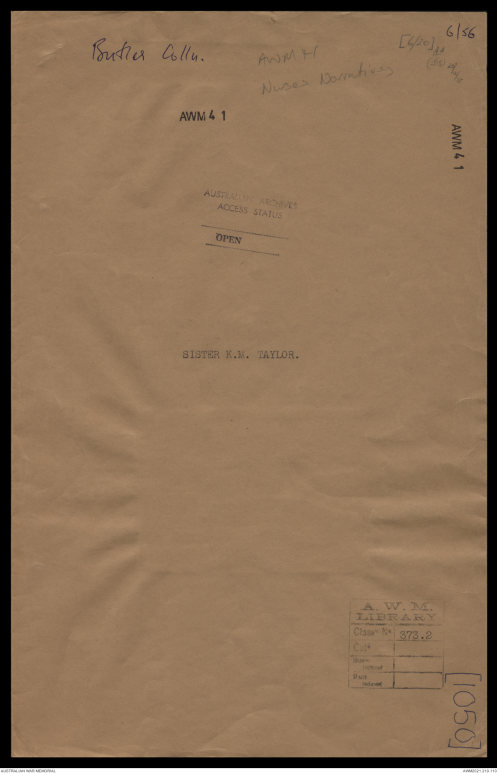
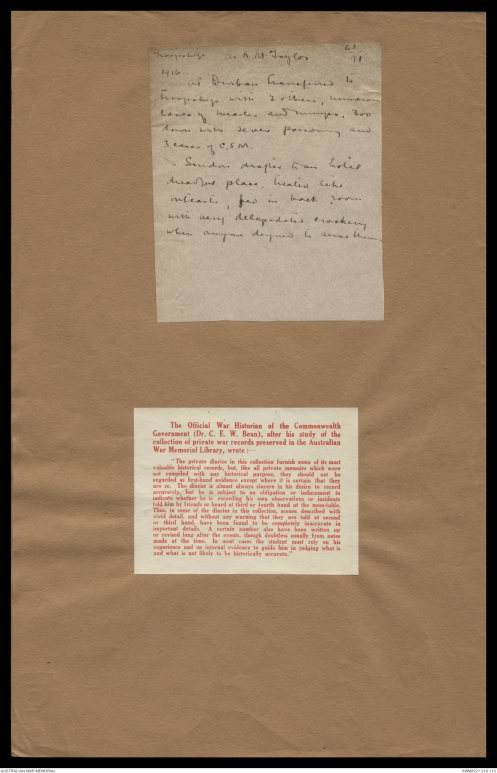
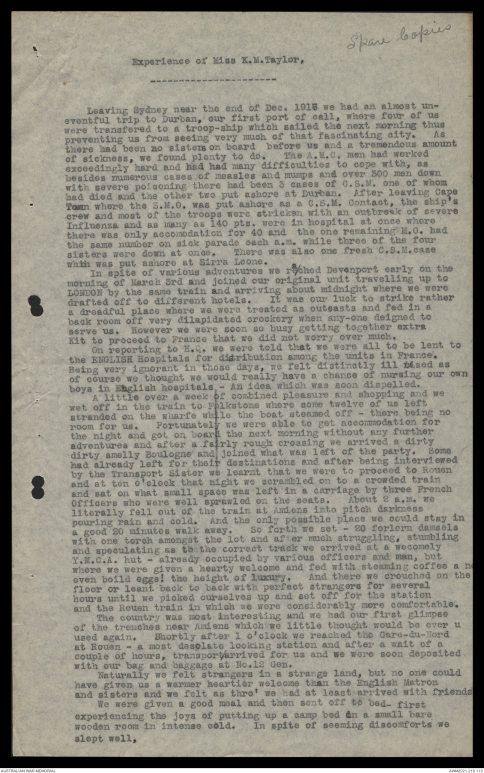
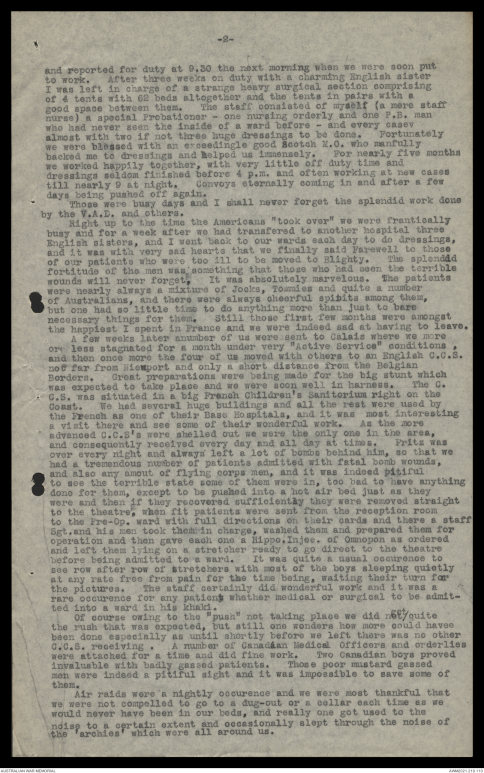
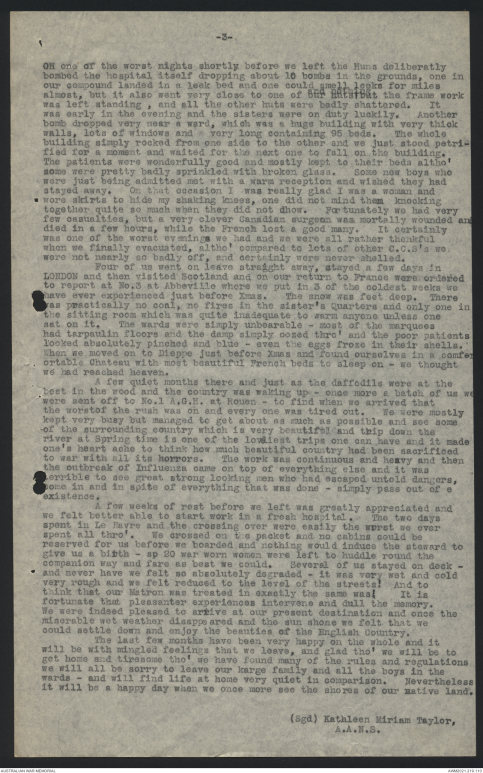
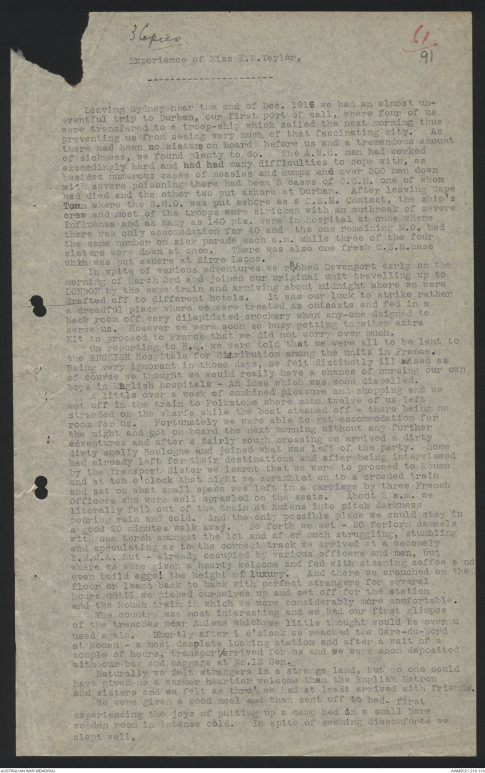
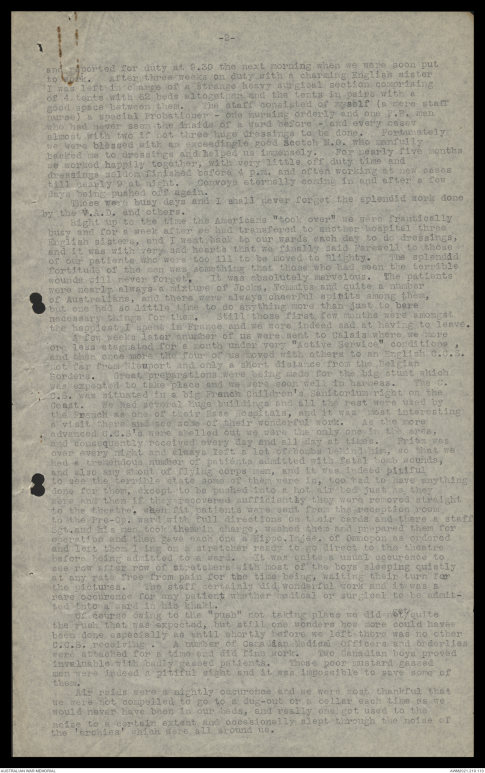
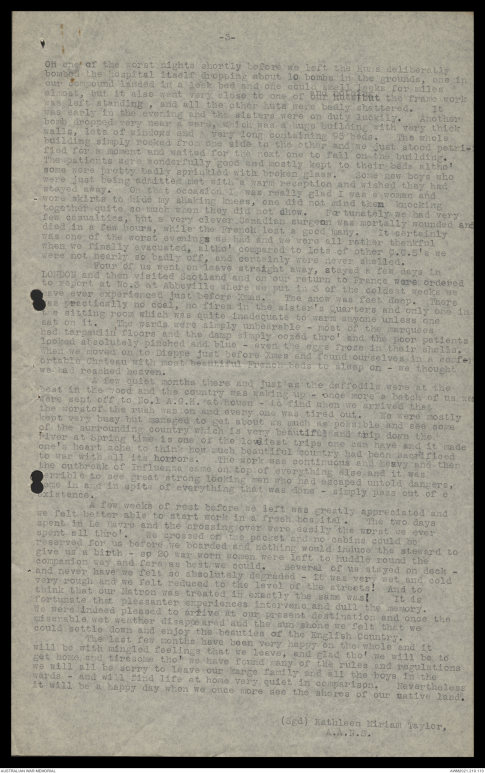
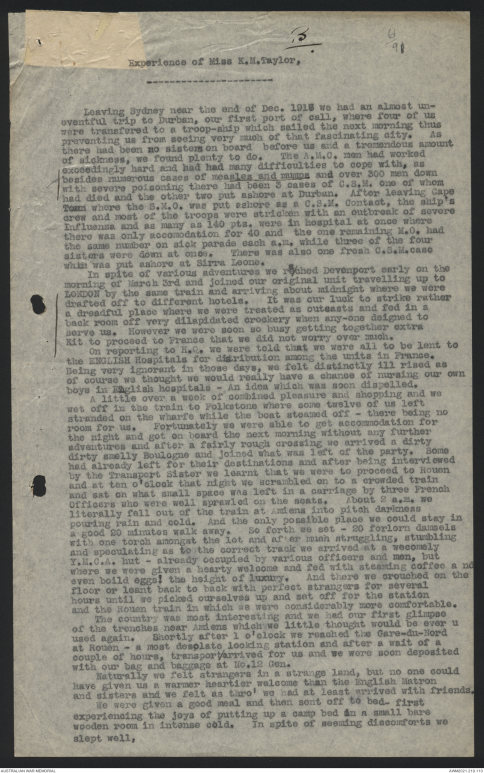
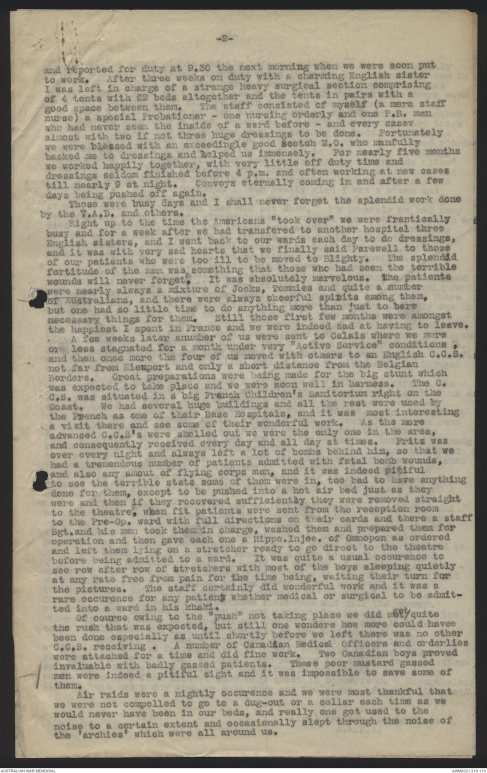
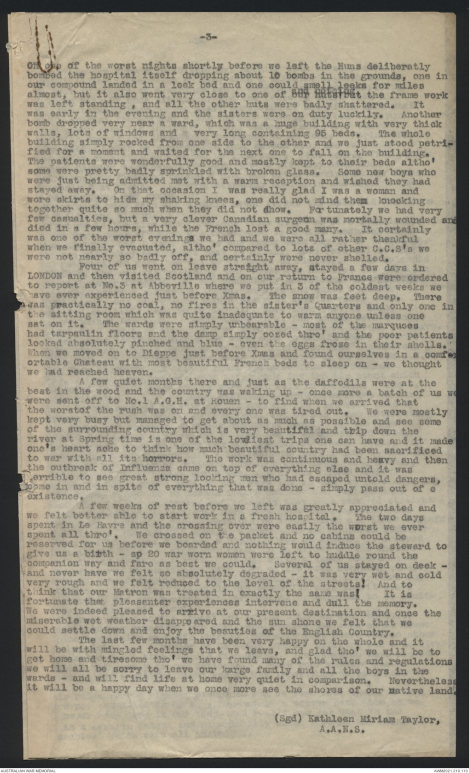
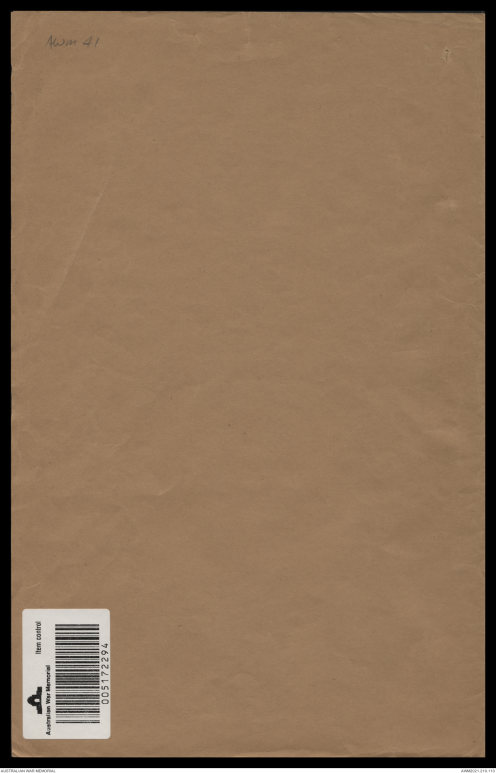
Butler Colln. 6/56
[6/20] Rt [[? ]]
AWM 4 1
Nurses Narratives
AWM 41
[*Australian Archive
ACCESS STATUS
OPEN*]
SISTER K.M. TAYLOR.
[*A.W.M.
LIBRARY
Class: 373.2
[1050]*]
Troop Ships Sr K M Taylor 61/91
1916
AT Durban transferred to
troop ship with 3 others, numerous
cases of measles and mumps. 300
down with severe poisoning and
3 cases of C.S.M.
London draftees to an hotel
dreadful place treated like
outcasts, few in back room
with very dilapidated crockery
when anyone deigned to serve them
The Official War Historian of the Commonwealth
Government (Dr. C. E. W. Bean), after his study of the
collection of private war records preserved in the Australian
War Memorial Library, wrote :
"The private diaries in this collection furnish some of its most
valuable historical records, but, like all private memoirs which were
not compiled with any historical purpose, they should not be
regarded as first-hand evidence except where it is certain that they
are so. The diarist is almost always sincere in his desire to record
accurately, but he is subject to no obligation or inducement to
indicate whether he is recording his own observations of incidents
told him by friends or heard at third or fourth hand at the mess-table.
Thus, in some of the diaries in this collection, scenes described with
vivid detail, and without any warning that they are told at second
or third hand, have been found to be completely inaccurate in
important details. A certain number also have been written up
or revised long after the events, though doubtless usually from notes
made at the time. In most cases the student must rely on his
experience and on internal evidence to guide him in judging what is
and what is not likely to be historically accurate."
[*Spare Copies*]
Experience of Miss K.M.Taylor,
Leaving Sydney near the end of Dec. 1915 we had an almost uneventful
trip to Durban, our first port of call, where four of us
were transfered to a troop-ship which sailed the next morning thus
preventing us from seeing very much of that fascinating city. As
there had been no sisters on board before us and a tremendous amount
of sickness, we found plenty to do. The A.M.C. men had worked
exceedingly hard and had had many difficulties to cope with, as
besides numerous cases of measles and mumps and over 300 men down
with severe poisoning there had been 3 cases of C.S.M, one of whom
had died and the other two put ashore at Durban. After leaving Cape
Town where the S.M.O. was put ashore as a C.S.M. Contact, the ship's
crew and most of the troops were stricken with an outbreak of severe
Influenza and as many as 140 pts. were in hospital at once where
there was only accomodation for 40 and the one remaining M.O. had
the same number on sick parade each a.m. while three of the four
sisters were down at once. There was also one fresh C.S.M. case
with was put ashore at Sirra Leone.
In spite of various adventures we re^ached Devonport early on the
morning of the March 3rd and joined our original unit travelling up to
LONDON by the same train and arriving about midnight where we were
drafted off to different hotels. It was out luck to strike rather
a dreadful place where we were treated as outcasts and fed in a
back room off very dilapidated crockery when any-one deigned to
serve us. However we were soon so busy getting together extra
Kit to proceed to France that we did not worry over much.
On reporting to H.Q. we were told that we were all to be lent to
the ENGLISH hospitals for distribution among the units in France.
Being very ignorant in those days, we felt distinctly ill used as
of course we thought we would really have a chance of nursing our own
boys in English hospitals - An idea which was soon dispelled.
A little over a week of combined pleasure and shopping and we
wet off in the train to Folkstons where some twelve of us left
stranded on the wharfs while the boat steamed off - there being no
room for us. Fortunately we were able to get accommodation for
the night and get on board the next morning without any further
adventures and after a fairly rough crossing we arrived a dirty
dirty smelly Boulogne and joined what was left of the party. Some
had already left for their destinations and after being interviewed
by the Transport Sister we learnt that we were to proceed to Rouen
and at ten o'clock that night we scrambled on to a crowded train
and sat on what small space was left in a carriage by three French
Officers who were well sprawled on the seats. About 2 a.m. we
literally fell out of the train at Amiens into pitch darkness
pouring rain and cold. And the only possible place we could stay in
a good 20 minutes walk away. So forth we set - 20 forlorn damsels
with one torch amongst the lot and after much struggling, stumbling
and speculating as to the correct track we arrived at a wecomely
Y.M.C.A. hut - already occupied by various officers and man, but
where we were given a hearty welcome and fed with steaming coffee a nd
even boild eggs! the height of luxury. And there we crouched on the
floor or leant back to back with perfect strangers for several
hours until we picked ourselves up and set off for the station
and the Reuen train in which we were considerably more comfortable.
The country was most interesting and we had our first glimpse
of the trenches near Amiens which we little thought would be ever u
used again. Shortly after 1 o'clock we reached the Care-du-Nord
at Rouen - a most desolate looking station and after a wait of a
couple of hours, transport/arrived for us and we were soon deposited
with our bag and baggage at No. 12 Gen.
Naturally we felt strangers in a strange land, but no one could
have given us a warmer heartier welcome than the English Matron
and sisters and we felt as thro' we had at least arrived with friends
We were given a good meal and then sent off to bed-first
experiencing the joys of putting up a camp bed in a small bare
wooden room in intense cold. In spite of seeming discomforts we
slept well,
-2-
and reported for duty at 9.30 the next morning when we were soon put
to work. After three weeks on duty with a charming English sister
I was left in charge of a strange heavy surgical section comprising
of 4 tents with 62 beds altogether and the tents in pairs with a
good space between them. The staff consisted of myself (a mere staff
nurse) a special Probationer - one nursing orderly and one F.B. man
who had never seen the inside of a ward before - and every casev
almost with two if not three huge dressings to be done. Fortunately
we were blessed with an exceedingle good Scotch M.O. who manfully
backed me to dressings and helped us immensely. For nearly five months
we worked happily together, with very little off duty time and
dressings seldom finished before 4p.m. and often working at new cases
till nearly 9 at night. Convoys eternally coming in and after a few
days being pushed off again.
Those were busy days and I shall never forget the splendid work done
by the V.A.D. and others.
Right up to the time the Americans ''took over'' we were frantically
busy and for a week after we had transfered to another hospital three
English sisters, and I went back to our wards each day to do dressings,
and it was with very sad hearts that we finally said Farewell to those
of our patients who were too ill to be moved to Blighty. The splendid
fortitude of the men was something that those who had seen the terrible
wounds will never forget. It was absolutely marvelous. The patients
were nearly always a mixture of Jocks, Tommies and quite a number
of Australians, and there were always cheerful spirits among them,
but one had so little time to do anything more than just to bare
necessary things for them. Still those first few months were amongst
the happiest I spent in France and we were indeed sad at having to leave.
A few weeks later anumber of us were sent to Calais where we more
or less stagnated for a month under very "Äctive Service" conditions ,
and then once more the four of us moved with others to an English C.C.S.
not far from Nienport and only a short distance from the Belgian
Borders. Great preparations were being made for the big stunt which
was expected to take place and we were soon well in harness. The C.C.S.
was situated in a big French Children's Sanitorium right on the
Coast. We had several huge buildings and all the rest were used by
the French as one of their Base Hospitals, and it was most interesting
a visit there and see some of their wonderful work. As the more
advanced C.C.S.'s were shelled out we were the only one in the area,
and consequently received every day and all day at all times. Fritz was
over every night and always left a lot of bombs behind him, so that we
had a tremendous number of patients admitted with fatal bomb wounds,
and also any amout of flying corps men, and it was indeed pitiful
to see the terrible state some of them were in, too bad to have anything
done for them, except to be pushed into a hot air bed just as they
were and then if they recovered sufficiently they were removed straight
to the theatre, when fit patients were sent from the reception room
to the Pre-Op. ward with full directions on their cards and there a staff
Sgt. and his men took them in charge, washed them and prepared them for
operation and then gave each one a Hippo.Injec. of Omnopon as ordered
and left them lying on a stretcher ready to go direct to the theatre
before being admitted to a ward. It was quite a usual occurrence to
see row after row of stretchers with most of the boys sleeping quietly
at any rate free from pain for the time being, waiting their turn for
the pictures. The staff certainly did wonderful work and it was a
rare occurence for any patient whether medical or surgical to be admitted
into a ward in his khaki.
Of course owing to the "push" not taking place we did not ^get quite
the rush that was expected, but still one wonders how more could havee
been done especially as until shortly before we left there was no other
C.C.S. receiving. A number of Canadian Medical Officers and orderlies
were attached for a time and did fine work. Two Canadian boys proved
invaluable with badly gassed patients. Those poor mustard gassed
men were indeed a pitiful sight and it was impossible to save some of
them.
Air raids were a nightly occurence and we were most thankful that
we were not compelled to go to a dug-out or a cellar each time as we
would never have been in our beds, and really one got used to the
noise to a certain extent and occasionally slept through the noise of
the 'archies' which were all around us.
-3-
ON one of the worst nights shortly before we left the Huns deliberately
bombed the hospital itself dropping about 10 bombs in the grounds, one in
our compound landed in a leek bed and one could smell leeks for miles
almost, but it also sent very close to one of our huts ^and nothing but the frame work
was left standing, and all the other huts were badly shattered. It
was early evening and the sisters were on duty luckily. Another
bomb dropped very near a ward, which was a huge building with very thick
walls, lots of windows and very long containing 95 beds. The whole
building simply rocked from one side to the other and we just stood petrified
for a moment and waited for the next one to fall on the building.
The patients were wonderfully good and mostly kept to their beds altho'
some were pretty badly sprinkled with broken glass. Some new boys who
were just being admitted met with a warm reception and wished they had
stayed away. On that occasion I was really glad I was a woman and
wore skirts to hide my shaking knees, one did not mind them knocking
together quite so much when they did not dhow. Fortunately we had
few casualties, but a very clever Canadian surgeon was mortally wounded and
died in a few hours, while the French lost a good many. It certainly
was one of the worst evenings we had and we were all rather thankful
when we finally evacuated, altho' compared to lots of other C.C.S's we
were not nearly so badly off, and certainly were never shelled.
Four of us went on leave straight away, stayed a few days in
LONDON and then visited Scotland and on our return to France were ordered
to report at No.3 at Abbeville where we put in 3 of the coldest weeks we
have ever experienced just before Xmas. The snow was feet deep. There
was practically no coal, no fires in the sister's Quarters and one in
the sitting room which was quite inadequate to warm anyone unless they
sat on it. The wards were simply unbearable - most of the marquees
had tarpaulin floors and the damp simply oozed thro' and the poor patients
looked absolutely pinched and blue - even the eggs froze in their shells.
When we moved on to Dieppe just before Xmas and found ourselves in a comfortable
Chateau with most beautiful French beds to sleep on - we thought
we had reached heaven.
A few quiet months there and just as the daffodils were at the
best in the wood and the country was waking up - once more a batch of us
were sent off to No.1 A.G.H. at Rouen - to find when we arrived that
the worstof the rush was on and every one was tired out. We were mostly
kept very busy but managed to get about as much as possible and see some
of the surrounding country which is very beautiful and trip down the
river at Spring time is one of the loveliest trips one can have and it made
one's heart ache to think how much beautiful country had been sacrificed
to war with all its horrors. The work was continuous and heavy and then
the outbreak of Influenza came on top of everything else and it was
terrible to see great strong looking men who had escaped untold dangers,
come in and in spite of everything that was done - simply pass out of e
existence.
A few weeks of rest before we left was greatly appreciated and
we felt better able to start work in a fresh hospital. The two days
spent in Le Havre and the crossing over were eaily the worst we ever
spent all thro'. We crossed on the packet and no cabins could be
reserved for us before we boarded and nothing would induce the steward to
give us a birth - ap 20 war worn women were left to huddle round the
companion way and fare as best we could. Several of us stayed on deck -
and never have we felt sos absolutely degraded - it was very wet and cold
very rough and we felt reduced to the level of the streets! And to
think that our Matron was trusted in exactly the same was! It is
fortunate that pleasanter experiences intervene and dull the memory.
We were indeed pleased to arrive at our present destination and once the
miserable wet weather disappeared and the sun shone we felt that we
could settle down and enjoy the beauties of the English Country.
The last few months have been very happy on the whole and it
will be with mingled feelings that we leave, and glad tho' we will be to
get home and tiresome tho' we have found many of the rules and regulations
we will all be sorry to leave our large family and all the boys in the
wards - and will find life at home very quiet in comparison. Nevertheless
it will be a happy day when we once more see the shores of our Native land.
(Sgd) Kathleen Miriam Taylor,
A.A.N.S.
3 Copies
61/91
Experience of Miss K.M.Taylor,
Leaving Sydney near the end of Dec. 1915 we had an almost uneventful
trip to Durban, our first port of call, where four of us
were transfered to a troop-ship which sailed the next morning thus
preventing us from seeing very much of that fascinating city. As
there had been no sisters on board before us and a tremendous amount
of sickness, we found plenty to do. The A.M.C. men had worked
exceedingly hard and had had many difficulties to cope with, as
besides numerous cases of measles and mumps and over 300 men down
with severe poisoning there had been 3 cases of C.S.M, one of whom
had died and the other two put ashore at Durban. After leaving Cape
Town where the S.M.O. was put ashore as a C.S.M. Contact, the ship's
crew and most of the troops were stricken with an outbreak of severe
Influenza and as many as 140 pts. were in hospital at once where
there was only accomodation for 40 and the one remaining M.O. had
the same number on sick parade each a.m. while three of the four
sisters were down at once. There was also one fresh C.S.M. case
with was put ashore at Sirra Leone.
In spite of various adventures we re^ached Devonport early on the
morning of the March 3rd and joined our original unit travelling up to
LONDON by the same train and arriving about midnight where we were
drafted off to different hotels. It was out luck to strike rather
a dreadful place where we were treated as outcasts and fed in a
back room off very dilapidated crockery when any-one deigned to
serve us. However we were soon so busy getting together extra
Kit to proceed to France that we did not worry over much.
On reporting to H.Q. we were told that we were all to be lent to
the ENGLISH hospitals for distribution among the units in France.
Being very ignorant in those days, we felt distinctly ill used as
of course we thought we would really have a chance of nursing our own
boys in English hospitals - An idea which was soon dispelled.
A little over a week of combined pleasure and shopping and we
wet off in the train to Folkstons where some twelve of us left
stranded on the wharfs while the boat steamed off - there being no
room for us. Fortunately we were able to get accommodation for
the night and get on board the next morning without any further
adventures and after a fairly rough crossing we arrived a dirty
dirty smelly Boulogne and joined what was left of the party. Some
had already left for their destinations and after being interviewed
by the Transport Sister we learnt that we were to proceed to Rouen
and at ten o'clock that night we scrambled on to a crowded train
and sat on what small space was left in a carriage by three French
Officers who were well sprawled on the seats. About 2 a.m. we
literally fell out of the train at Amiens into pitch darkness
pouring rain and cold. And the only possible place we could stay in
a good 20 minutes walk away. So forth we set - 20 forlorn damsels
with one torch amongst the lot and after much struggling, stumbling
and speculating as to the correct track we arrived at a wecomely
Y.M.C.A. hut - already occupied by various officers and man, but
where we were given a hearty welcome and fed with steaming coffee a nd
even boild eggs! the height of luxury. And there we crouched on the
floor or leant back to back with perfect strangers for several
hours until we picked ourselves up and set off for the station
and the Reuen train in which we were considerably more comfortable.
The country was most interesting and we had our first glimpse
of the trenches near Amiens which we little thought would be ever u
used again. Shortly after 1 o'clock we reached the Care-du-Nord
at Rouen - a most desolate looking station and after a wait of a
couple of hours, transport/arrived for us and we were soon deposited
with our bag and baggage at No. 12 Gen.
Naturally we felt strangers in a strange land, but no one could
have given us a warmer heartier welcome than the English Matron
and sisters and we felt as thro' we had at least arrived with friends
We were given a good meal and then sent off to bed-first
experiencing the joys of putting up a camp bed in a small bare
wooden room in intense cold. In spite of seeming discomforts we
slept well,
-2-
and reported for duty at 9.30 the next morning when we were soon put
to work. After three weeks on duty with a charming English sister
I was left in charge of a strange heavy surgical section comprising
of 4 tents with 62 beds altogether and the tents in pairs with a
good space between them. The staff consisted of myself (a mere staff
nurse) a special Probationer - one nursing orderly and one F.B. man
who had never seen the inside of a ward before - and every casev
almost with two if not three huge dressings to be done. Fortunately
we were blessed with an exceedingle good Scotch M.O. who manfully
backed me to dressings and helped us immensely. For nearly five months
we worked happily together, with very little off duty time and
dressings seldom finished before 4p.m. and often working at new cases
till nearly 9 at night. Convoys eternally coming in and after a few
days being pushed off again.
Those were busy days and I shall never forget the splendid work done
by the V.A.D. and others.
Right up to the time the Americans ''took over'' we were frantically
busy and for a week after we had transfered to another hospital three
English sisters, and I went back to our wards each day to do dressings,
and it was with very sad hearts that we finally said Farewell to those
of our patients who were too ill to be moved to Blighty. The splendid
fortitude of the men was something that those who had seen the terrible
wounds will never forget. It was absolutely marvelous. The patients
were nearly always a mixture of Jocks, Tommies and quite a number
of Australians, and there were always cheerful spirits among them,
but one had so little time to do anything more than just to bare
necessary things for them. Still those first few months were amongst
the happiest I spent in France and we were indeed sad at having to leave.
A few weeks later anumber of us were sent to Calais where we more
or less stagnated for a month under very "Äctive Service" conditions ,
and then once more the four of us moved with others to an English C.C.S.
not far from Nienport and only a short distance from the Belgian
Borders. Great preparations were being made for the big stunt which
was expected to take place and we were soon well in harness. The C.C.S.
was situated in a big French Children's Sanitorium right on the
Coast. We had several huge buildings and all the rest were used by
the French as one of their Base Hospitals, and it was most interesting
a visit there and see some of their wonderful work. As the more
advanced C.C.S.'s were shelled out we were the only one in the area,
and consequently received every day and all day at all times. Fritz was
over every night and always left a lot of bombs behind him, so that we
had a tremendous number of patients admitted with fatal bomb wounds,
and also any amout of flying corps men, and it was indeed pitiful
to see the terrible state some of them were in, too bad to have anything
done for them, except to be pushed into a hot air bed just as they
were and then if they recovered sufficiently they were removed straight
to the theatre, when fit patients were sent from the reception room
to the Pre-Op. ward with full directions on their cards and there a staff
Sgt. and his men took them in charge, washed them and prepared them for
operation and then gave each one a Hippo.Injec. of Omnopon as ordered
and left them lying on a stretcher ready to go direct to the theatre
before being admitted to a ward. It was quite a usual occurrence to
see row after row of stretchers with most of the boys sleeping quietly
at any rate free from pain for the time being, waiting their turn for
the pictures. The staff certainly did wonderful work and it was a
rare occurence for any patient whether medical or surgical to be admitted
into a ward in his khaki.
Of course owing to the "push" not taking place we did not ^get quite
the rush that was expected, but still one wonders how more could havee
been done especially as until shortly before we left there was no other
C.C.S. receiving. A number of Canadian Medical Officers and orderlies
were attached for a time and did fine work. Two Canadian boys proved
invaluable with badly gassed patients. Those poor mustard gassed
men were indeed a pitiful sight and it was impossible to save some of
them.
Air raids were a nightly occurence and we were most thankful that
we were not compelled to go to a dug-out or a cellar each time as we
would never have been in our beds, and really one got used to the
noise to a certain extent and occasionally slept through the noise of
the 'archies' which were all around us.
-3-
ON one of the worst nights shortly before we left the Huns deliberately
bombed the hospital itself dropping about 10 bombs in the grounds, one in
our compound landed in a leek bed and one could smell leeks for miles
almost, but it also sent very close to one of our huts ^and nothing but the frame work
was left standing, and all the other huts were badly shattered. It
was early evening and the sisters were on duty luckily. Another
bomb dropped very near a ward, which was a huge building with very thick
walls, lots of windows and very long containing 95 beds. The whole
building simply rocked from one side to the other and we just stood petrified
for a moment and waited for the next one to fall on the building.
The patients were wonderfully good and mostly kept to their beds altho'
some were pretty badly sprinkled with broken glass. Some new boys who
were just being admitted met with a warm reception and wished they had
stayed away. On that occasion I was really glad I was a woman and
wore skirts to hide my shaking knees, one did not mind them knocking
together quite so much when they did not dhow. Fortunately we had
few casualties, but a very clever Canadian surgeon was mortally wounded and
died in a few hours, while the French lost a good many. It certainly
was one of the worst evenings we had and we were all rather thankful
when we finally evacuated, altho' compared to lots of other C.C.S's we
were not nearly so badly off, and certainly were never shelled.
Four of us went on leave straight away, stayed a few days in
LONDON and then visited Scotland and on our return to France were ordered
to report at No.3 at Abbeville where we put in 3 of the coldest weeks we
have ever experienced just before Xmas. The snow was feet deep. There
was practically no coal, no fires in the sister's Quarters and one in
the sitting room which was quite inadequate to warm anyone unless they
sat on it. The wards were simply unbearable - most of the marquees
had tarpaulin floors and the damp simply oozed thro' and the poor patients
looked absolutely pinched and blue - even the eggs froze in their shells.
When we moved on to Dieppe just before Xmas and found ourselves in a comfortable
Chateau with most beautiful French beds to sleep on - we thought
we had reached heaven.
A few quiet months there and just as the daffodils were at the
best in the wood and the country was waking up - once more a batch of us
were sent off to No.1 A.G.H. at Rouen - to find when we arrived that
the worstof the rush was on and every one was tired out. We were mostly
kept very busy but managed to get about as much as possible and see some
of the surrounding country which is very beautiful and trip down the
river at Spring time is one of the loveliest trips one can have and it made
one's heart ache to think how much beautiful country had been sacrificed
to war with all its horrors. The work was continuous and heavy and then
the outbreak of Influenza came on top of everything else and it was
terrible to see great strong looking men who had escaped untold dangers,
come in and in spite of everything that was done - simply pass out of e
existence.
A few weeks of rest before we left was greatly appreciated and
we felt better able to start work in a fresh hospital. The two days
spent in Le Havre and the crossing over were eaily the worst we ever
spent all thro'. We crossed on the packet and no cabins could be
reserved for us before we boarded and nothing would induce the steward to
give us a birth - ap 20 war worn women were left to huddle round the
companion way and fare as best we could. Several of us stayed on deck -
and never have we felt sos absolutely degraded - it was very wet and cold
very rough and we felt reduced to the level of the streets! And to
think that our Matron was trusted in exactly the same was! It is
fortunate that pleasanter experiences intervene and dull the memory.
We were indeed pleased to arrive at our present destination and once the
miserable wet weather disappeared and the sun shone we felt that we
could settle down and enjoy the beauties of the English Country.
The last few months have been very happy on the whole and it
will be with mingled feelings that we leave, and glad tho' we will be to
get home and tiresome tho' we have found many of the rules and regulations
we will all be sorry to leave our large family and all the boys in the
wards - and will find life at home very quiet in comparison. Nevertheless
it will be a happy day when we once more see the shores of our Native land.
(Sgd) Kathleen Miriam Taylor,
A.A.N.S.
3
61/91
Experience of Miss K.M.Taylor,
Leaving Sydney near the end of Dec. 1915 we had an almost uneventful
trip to Durban, our first port of call, where four of us
were transfered to a troop-ship which sailed the next morning thus
preventing us from seeing very much of that fascinating city. As
there had been no sisters on board before us and a tremendous amount
of sickness, we found plenty to do. The A.M.C. men had worked
exceedingly hard and had had many difficulties to cope with, as
besides numerous cases of measles and mumps and over 300 men down
with severe poisoning there had been 3 cases of C.S.M, one of whom
had died and the other two put ashore at Durban. After leaving Cape
Town where the S.M.O. was put ashore as a C.S.M. Contact, the ship's
crew and most of the troops were stricken with an outbreak of severe
Influenza and as many as 140 pts. were in hospital at once where
there was only accomodation for 40 and the one remaining M.O. had
the same number on sick parade each a.m. while three of the four
sisters were down at once. There was also one fresh C.S.M. case
with was put ashore at Sirra Leone.
In spite of various adventures we re^ached Devonport early on the
morning of the March 3rd and joined our original unit travelling up to
LONDON by the same train and arriving about midnight where we were
drafted off to different hotels. It was out luck to strike rather
a dreadful place where we were treated as outcasts and fed in a
back room off very dilapidated crockery when any-one deigned to
serve us. However we were soon so busy getting together extra
Kit to proceed to France that we did not worry over much.
On reporting to H.Q. we were told that we were all to be lent to
the ENGLISH hospitals for distribution among the units in France.
Being very ignorant in those days, we felt distinctly ill used as
of course we thought we would really have a chance of nursing our own
boys in English hospitals - An idea which was soon dispelled.
A little over a week of combined pleasure and shopping and we
wet off in the train to Folkstons where some twelve of us left
stranded on the wharfs while the boat steamed off - there being no
room for us. Fortunately we were able to get accommodation for
the night and get on board the next morning without any further
adventures and after a fairly rough crossing we arrived a dirty
dirty smelly Boulogne and joined what was left of the party. Some
had already left for their destinations and after being interviewed
by the Transport Sister we learnt that we were to proceed to Rouen
and at ten o'clock that night we scrambled on to a crowded train
and sat on what small space was left in a carriage by three French
Officers who were well sprawled on the seats. About 2 a.m. we
literally fell out of the train at Amiens into pitch darkness
pouring rain and cold. And the only possible place we could stay in
a good 20 minutes walk away. So forth we set - 20 forlorn damsels
with one torch amongst the lot and after much struggling, stumbling
and speculating as to the correct track we arrived at a wecomely
Y.M.C.A. hut - already occupied by various officers and man, but
where we were given a hearty welcome and fed with steaming coffee a nd
even boild eggs! the height of luxury. And there we crouched on the
floor or leant back to back with perfect strangers for several
hours until we picked ourselves up and set off for the station
and the Reuen train in which we were considerably more comfortable.
The country was most interesting and we had our first glimpse
of the trenches near Amiens which we little thought would be ever u
used again. Shortly after 1 o'clock we reached the Care-du-Nord
at Rouen - a most desolate looking station and after a wait of a
couple of hours, transport/arrived for us and we were soon deposited
with our bag and baggage at No. 12 Gen.
Naturally we felt strangers in a strange land, but no one could
have given us a warmer heartier welcome than the English Matron
and sisters and we felt as thro' we had at least arrived with friends
We were given a good meal and then sent off to bed-first
experiencing the joys of putting up a camp bed in a small bare
wooden room in intense cold. In spite of seeming discomforts we
slept well,
-2-
and reported for duty at 9.30 the next morning when we were soon put
to work. After three weeks on duty with a charming English sister
I was left in charge of a strange heavy surgical section comprising
of 4 tents with 62 beds altogether and the tents in pairs with a
good space between them. The staff consisted of myself (a mere staff
nurse) a special Probationer - one nursing orderly and one F.B. man
who had never seen the inside of a ward before - and every casev
almost with two if not three huge dressings to be done. Fortunately
we were blessed with an exceedingle good Scotch M.O. who manfully
backed me to dressings and helped us immensely. For nearly five months
we worked happily together, with very little off duty time and
dressings seldom finished before 4p.m. and often working at new cases
till nearly 9 at night. Convoys eternally coming in and after a few
days being pushed off again.
Those were busy days and I shall never forget the splendid work done
by the V.A.D. and others.
Right up to the time the Americans ''took over'' we were frantically
busy and for a week after we had transfered to another hospital three
English sisters, and I went back to our wards each day to do dressings,
and it was with very sad hearts that we finally said Farewell to those
of our patients who were too ill to be moved to Blighty. The splendid
fortitude of the men was something that those who had seen the terrible
wounds will never forget. It was absolutely marvelous. The patients
were nearly always a mixture of Jocks, Tommies and quite a number
of Australians, and there were always cheerful spirits among them,
but one had so little time to do anything more than just to bare
necessary things for them. Still those first few months were amongst
the happiest I spent in France and we were indeed sad at having to leave.
A few weeks later anumber of us were sent to Calais where we more
or less stagnated for a month under very "Äctive Service" conditions ,
and then once more the four of us moved with others to an English C.C.S.
not far from Nienport and only a short distance from the Belgian
Borders. Great preparations were being made for the big stunt which
was expected to take place and we were soon well in harness. The C.C.S.
was situated in a big French Children's Sanitorium right on the
Coast. We had several huge buildings and all the rest were used by
the French as one of their Base Hospitals, and it was most interesting
a visit there and see some of their wonderful work. As the more
advanced C.C.S.'s were shelled out we were the only one in the area,
and consequently received every day and all day at all times. Fritz was
over every night and always left a lot of bombs behind him, so that we
had a tremendous number of patients admitted with fatal bomb wounds,
and also any amout of flying corps men, and it was indeed pitiful
to see the terrible state some of them were in, too bad to have anything
done for them, except to be pushed into a hot air bed just as they
were and then if they recovered sufficiently they were removed straight
to the theatre, when fit patients were sent from the reception room
to the Pre-Op. ward with full directions on their cards and there a staff
Sgt. and his men took them in charge, washed them and prepared them for
operation and then gave each one a Hippo.Injec. of Omnopon as ordered
and left them lying on a stretcher ready to go direct to the theatre
before being admitted to a ward. It was quite a usual occurrence to
see row after row of stretchers with most of the boys sleeping quietly
at any rate free from pain for the time being, waiting their turn for
the pictures. The staff certainly did wonderful work and it was a
rare occurence for any patient whether medical or surgical to be admitted
into a ward in his khaki.
Of course owing to the "push" not taking place we did not ^get quite
the rush that was expected, but still one wonders how more could havee
been done especially as until shortly before we left there was no other
C.C.S. receiving. A number of Canadian Medical Officers and orderlies
were attached for a time and did fine work. Two Canadian boys proved
invaluable with badly gassed patients. Those poor mustard gassed
men were indeed a pitiful sight and it was impossible to save some of
them.
Air raids were a nightly occurence and we were most thankful that
we were not compelled to go to a dug-out or a cellar each time as we
would never have been in our beds, and really one got used to the
noise to a certain extent and occasionally slept through the noise of
the 'archies' which were all around us.
-3-
ON one of the worst nights shortly before we left the Huns deliberately
bombed the hospital itself dropping about 10 bombs in the grounds, one in
our compound landed in a leek bed and one could smell leeks for miles
almost, but it also sent very close to one of our huts ^and nothing but the frame work
was left standing, and all the other huts were badly shattered. It
was early evening and the sisters were on duty luckily. Another
bomb dropped very near a ward, which was a huge building with very thick
walls, lots of windows and very long containing 95 beds. The whole
building simply rocked from one side to the other and we just stood petrified
for a moment and waited for the next one to fall on the building.
The patients were wonderfully good and mostly kept to their beds altho'
some were pretty badly sprinkled with broken glass. Some new boys who
were just being admitted met with a warm reception and wished they had
stayed away. On that occasion I was really glad I was a woman and
wore skirts to hide my shaking knees, one did not mind them knocking
together quite so much when they did not dhow. Fortunately we had
few casualties, but a very clever Canadian surgeon was mortally wounded and
died in a few hours, while the French lost a good many. It certainly
was one of the worst evenings we had and we were all rather thankful
when we finally evacuated, altho' compared to lots of other C.C.S's we
were not nearly so badly off, and certainly were never shelled.
Four of us went on leave straight away, stayed a few days in
LONDON and then visited Scotland and on our return to France were ordered
to report at No.3 at Abbeville where we put in 3 of the coldest weeks we
have ever experienced just before Xmas. The snow was feet deep. There
was practically no coal, no fires in the sister's Quarters and one in
the sitting room which was quite inadequate to warm anyone unless they
sat on it. The wards were simply unbearable - most of the marquees
had tarpaulin floors and the damp simply oozed thro' and the poor patients
looked absolutely pinched and blue - even the eggs froze in their shells.
When we moved on to Dieppe just before Xmas and found ourselves in a comfortable
Chateau with most beautiful French beds to sleep on - we thought
we had reached heaven.
A few quiet months there and just as the daffodils were at the
best in the wood and the country was waking up - once more a batch of us
were sent off to No.1 A.G.H. at Rouen - to find when we arrived that
the worstof the rush was on and every one was tired out. We were mostly
kept very busy but managed to get about as much as possible and see some
of the surrounding country which is very beautiful and trip down the
river at Spring time is one of the loveliest trips one can have and it made
one's heart ache to think how much beautiful country had been sacrificed
to war with all its horrors. The work was continuous and heavy and then
the outbreak of Influenza came on top of everything else and it was
terrible to see great strong looking men who had escaped untold dangers,
come in and in spite of everything that was done - simply pass out of e
existence.
A few weeks of rest before we left was greatly appreciated and
we felt better able to start work in a fresh hospital. The two days
spent in Le Havre and the crossing over were eaily the worst we ever
spent all thro'. We crossed on the packet and no cabins could be
reserved for us before we boarded and nothing would induce the steward to
give us a birth - ap 20 war worn women were left to huddle round the
companion way and fare as best we could. Several of us stayed on deck -
and never have we felt sos absolutely degraded - it was very wet and cold
very rough and we felt reduced to the level of the streets! And to
think that our Matron was trusted in exactly the same was! It is
fortunate that pleasanter experiences intervene and dull the memory.
We were indeed pleased to arrive at our present destination and once the
miserable wet weather disappeared and the sun shone we felt that we
could settle down and enjoy the beauties of the English Country.
The last few months have been very happy on the whole and it
will be with mingled feelings that we leave, and glad tho' we will be to
get home and tiresome tho' we have found many of the rules and regulations
we will all be sorry to leave our large family and all the boys in the
wards - and will find life at home very quiet in comparison. Nevertheless
it will be a happy day when we once more see the shores of our Native land.
(Sgd) Kathleen Miriam Taylor,
A.A.N.S.
 Sam scott
Sam scottThis transcription item is now locked to you for editing. To release the lock either Save your changes or Cancel.
This lock will be automatically released after 60 minutes of inactivity.